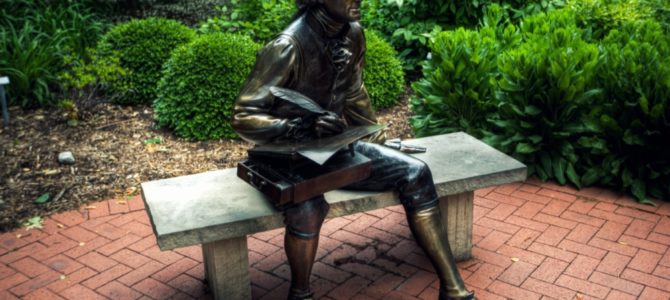
It is believed playwright George Bernard Shaw once said “Every man deserves to be judged in the context of his times.” While that sentiment often goes unheeded, in our current moment it seems to be under full-blown assault. Hardly an hour goes by without demands — even preemptive actions — to topple a monument or statue memorializing someone from the past.
A Thomas Jefferson statue is the latest target for my alma mater, the University of Missouri. Since 1885, the campus has displayed the original obelisk which marked Jefferson’s grave at Monticello. The spirit of how Jefferson sought to be remembered is affixed on the grave marker:
Here was buried
Thomas Jefferson
Author of the Declaration of American Independence
of the Statute of Virginia for religious freedom
& Father of the University of Virginia
It is assumed MU received the honor partly due to the fact it was the first public university established within the territory of the Louisiana Purchase — a hallmark achievement of Jefferson’s presidency. The marker has come under criticism before, but the most recent storm is over a bronze statue of Jefferson placed on the campus quadrangle in 2001.
The lead charge against Jefferson is the cold reality that he, indeed, owned slaves. Similar anger was unleashed recently at a statue of Jefferson in front of an Oregon High School named after him. Jefferson was pulled from its pedestal, toppled, and his neck festooned with a sign reading “slaveholder.”
I have yet to read where anyone suggests that memorials to Jefferson were erected to honor him as a slaveholder. Truly, is that the way he should be judged as a historical figure? Nay, we honor him for his contributions to the American founding, the inspiring words he penned as the author of the Declaration of Independence, and his service as the third President of the United States.
If his most severe critics were transported back to the founding era without the benefit of the acquired knowledge and evolving morality of the past two centuries, would they have the same positions they hold today? Isn’t it even possible for those same critics to acknowledge — with a bit of humility and introspection — that the life and works of Jefferson and other Founders contributed greatly to the very morality they subscribe to; that we are all created equal in the eyes of God?
The Founders were the product of their times. Not only were they born into an era of slavery, but many were also raised in families that owned slaves. Ultimately, however, they set into motion the foundation for not only a more egalitarian future society but also set slavery unto the path to extinction. That is a central thesis of one of Lincoln’s most important political speeches, the one he gave at Cooper Union in New York City in early 1860.
In his masterpiece, Empire of Liberty, famed historian Gordon Wood wrote that some may view the Founders as hypocrites when their actions are viewed in light of their own words. To counter, Woods quoted historian Lynn Hunt:
We should not forget the restrictions placed on rights of eighteenth-century men, but to stop there while patting ourselves on the back for our own comparative “advancement” is to miss the point. How did these men living in society based on slavery, subordination and seemingly natural subservience, ever come to imagine men at all not like them, and in some cases, women too as equals.
Viewing the contributions of people who lived centuries ago based on the standards of today could result in a Junior High Student being considered a better scientist than Galileo. Yet have any of the most severe critics of the Founders contributed much to society’s evolution towards a more just society? How is the current morality of the statue topplers going to hold up 250 years from now?
We also need to dispense with the notion that there are wide swaths of the country that have never learned about America’s relationship with slavery. That many of the Founders were slaveholders is something I learned that when going to school in the ’60s in a one-room schoolhouse in rural Missouri. If that historical fact made it to rural Northeast Missouri I tend to think it likely surfaced elsewhere.
While it would be incorrect to suggest there were no elements of U.S. slavery as it existed in the South that were more severe than in the other areas of the world, it is important to remember that the United States did not event slavery. There is an irony that many of the loudest voices demand a “discussion” on race, yet seem uninterested in anything that might counter their narrative. Differing views on the past or calls for proper context are frequently met with the charge of “white privilege” — as if that was a substantive response.
Opponents of the Founders are largely ignorant of both the Founding Era and the political realities of the time. An attempt to abolish slavery in 1787 would have meant the disunion of the United States into two or three adversarial confederacies. Would those in bondage be better off if the lower south had established its own confederation more than fifty years before the Civil War?
Typically, all of these conversations are placed within the broad context of what is now referred to as “cancel culture.” I am not sure that describes what is going on. It looks to be the protagonists are less interested in “canceling” culture and history but in corroding our culture and history.
Administrators with the University of Missouri recently announced that the statue would not be removed. The University noted it will not “remove history” and that history needs to be contextualized. Those wanting it removed or at least moved to a less prominent area have vowed they will not give up the fight. Regardless though the University seems to be one institution that is pushing back against the current demand of removing “controversial” historical monuments. So, while not exactly standing tall Jefferson sits, quill in hand on his bench, as his fate remains to be determined.
Interestingly, there is a more famous statue on the campus of the University of Missouri than that of Jefferson. It is that of Beetle Bailey which was erected in recognition of Beetle’s creator Mort Cooper, who created the character while he was a student at the University. Certainly, Beetle is essentially known for his service in the United States Army. While not memorialized wearing his Army fatigues would it at all be surprised if you turn on the news someday you don’t hear a demand for Private Bailey’s presence to be removed from campus. Don’t think it could happen? His statue could certainly “offend” some for its “glorification” of the “imperialistic nature” of the United States. Of course if Beetle would renounce his white privilege he just might survive until the next round of moral indignation.









